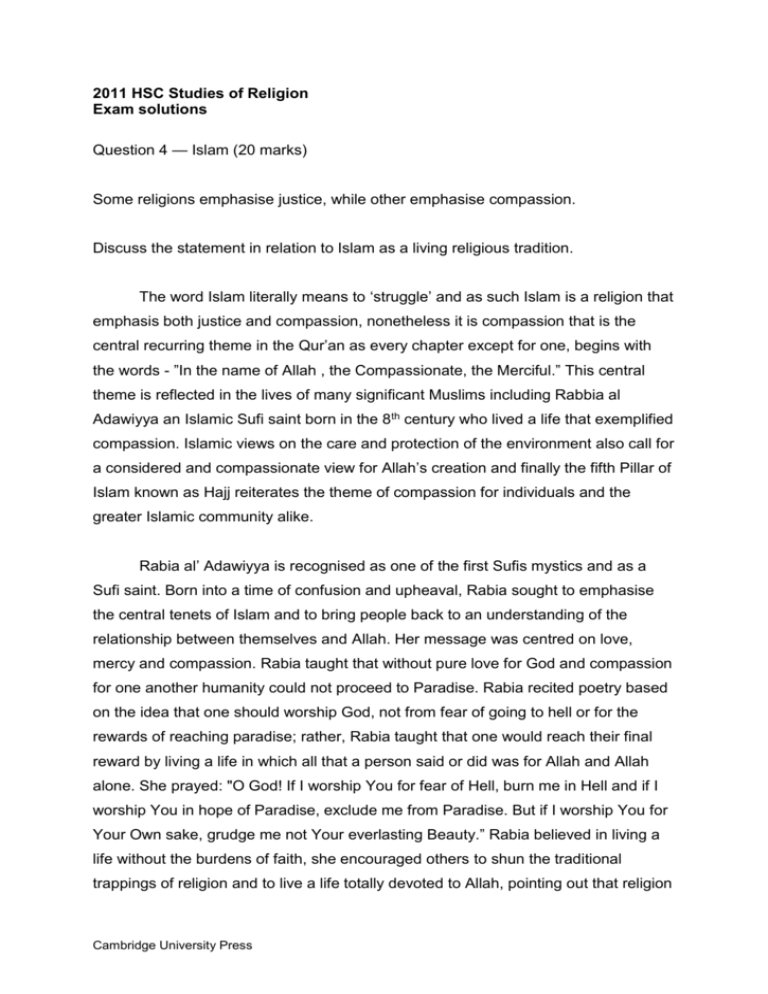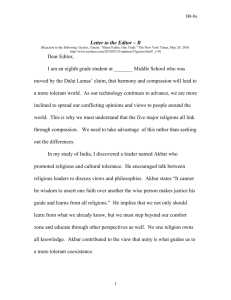2011 HSC Studies of Religion Exam solutions Question 4 — Islam
advertisement

2011 HSC Studies of Religion Exam solutions Question 4 — Islam (20 marks) Some religions emphasise justice, while other emphasise compassion. Discuss the statement in relation to Islam as a living religious tradition. The word Islam literally means to ‘struggle’ and as such Islam is a religion that emphasis both justice and compassion, nonetheless it is compassion that is the central recurring theme in the Qur’an as every chapter except for one, begins with the words - ”In the name of Allah , the Compassionate, the Merciful.” This central theme is reflected in the lives of many significant Muslims including Rabbia al Adawiyya an Islamic Sufi saint born in the 8th century who lived a life that exemplified compassion. Islamic views on the care and protection of the environment also call for a considered and compassionate view for Allah’s creation and finally the fifth Pillar of Islam known as Hajj reiterates the theme of compassion for individuals and the greater Islamic community alike. Rabia al’ Adawiyya is recognised as one of the first Sufis mystics and as a Sufi saint. Born into a time of confusion and upheaval, Rabia sought to emphasise the central tenets of Islam and to bring people back to an understanding of the relationship between themselves and Allah. Her message was centred on love, mercy and compassion. Rabia taught that without pure love for God and compassion for one another humanity could not proceed to Paradise. Rabia recited poetry based on the idea that one should worship God, not from fear of going to hell or for the rewards of reaching paradise; rather, Rabia taught that one would reach their final reward by living a life in which all that a person said or did was for Allah and Allah alone. She prayed: "O God! If I worship You for fear of Hell, burn me in Hell and if I worship You in hope of Paradise, exclude me from Paradise. But if I worship You for Your Own sake, grudge me not Your everlasting Beauty.” Rabia believed in living a life without the burdens of faith, she encouraged others to shun the traditional trappings of religion and to live a life totally devoted to Allah, pointing out that religion Cambridge University Press teaches humans to worship Allah, through good actions and good intentions. There is evidence to suggest that Rabia held great compassion for those born into slavery as she had once been a slave herself and she was very concerned about all forms of slavery, by helping to assimilate slaves into Muslim society of the time. Indeed Rabia refused to have a slave when she was offered one later in life. This attitude exemplified the teaching "And what will explain to you what the steep path is? It is the freeing of a (slave) from bondage; or the giving of food in a day of famine to an orphan relative, or to a needy in distress. Then will he be of those who believe, enjoin fortitude and encourage kindness and compassion." Qur’an Chapter 90, Verses 12-17 Islam is a faith that centres on the centrality and oneness of Allah –known as Tawhid. Tawhid underpins the notion of compassion and the belief that, if everything is created by God then everything should be returned to God in its fullness. The Qur’an preaches compassion, confirming that to be empathetic, humans should avoid imposing pain on others; believing that compassion makes humans become closer to Allah and that this in turn brings good upon themselves. ‘Those who act kindly in this world will have kindness.” Qur’an 39. The core of environmental ethical teachings states that humans have been given responsibility by Allah for the care of this earth and that they will be accountable to God for their actions. Muslims expect that humans should act as Kalifah or trustees for the environment because they are given special responsibilities by Allah to care for it. “Who has made the earth your couch, and the heavens your canopy; and sent down rain from the heavens; and brought forth therewith fruits for your sustenance; then set not up rivals unto God when ye know (the truth)” Qur’an 41. An international Islamic environmentally proactive group that strives to bring the message of compassion is – ‘Wisdom In Nature’. WIN is an ecological & community group guided by Islamic principles of justice and compassion. This group welcomes all faiths and strives to make local and international communities aware of environmental issues such as climate change. On a local level students from the al-Ghazzali Centre for Islamic Sciences and Human Development in Sydney, are replanting and maintaining area of native vegetation along the Cooks River foreshore in Sydney’s inner west. This is a good example of a “Bushcare” volunteer project that evolved from the activities and interests of an already established community group. Cambridge University Press Followers of Islam put their faith into practice by following five pillars and these pillars are an embodiment of their faith. Each of the pillars relates directly back to Islamic teachings that are concerned with compassion, justice and mercy, calling all Muslims to do good deeds and to perform good actions. The Hajj is a demonstration of the unity of the Muslim people, and their submission to Allah Hajj is a compulsory (fard) complex ritual performed by Muslims at least once in their lifetime if they are financially and physically able it is performed as a demonstration of the Ummah (unity) of the Muslim people, and their submission to Allah. Hajj is performed over a number of days with specific rituals enacted each day linking Muslims to the historic past and their present spiritual reality. The pinnacle of Hajj falls on the 9 th day of Dhul Hijja it is on this day that Muslims are required to spend the day on the plain of Arafat and if possible climb the Mount of Mercy. The ‘Day of Arafat’ also known as the Day of Repentance is the day when Muslims gather together at Mount Arafat in an act of solidarity to pray for mercy and compassion and to offer sacrifices as they remember that Abraham offered Ishmael to Allah. Islam is a religion that places compassion for others at its core. Compassion, justice, mercy and concern for others are essential element of Islamic teaching and practice. Muslims turn to significant people in their history such as Rabia al Adawiyya to act as role models for these teachings, they put these ideas into practice through their responses to issues associated with environmental degradation and they make the link between the mundane and the sacred through prayer and repentance in the significant practice known as Hajj. Cambridge University Press









